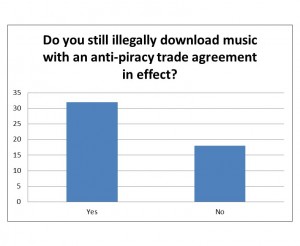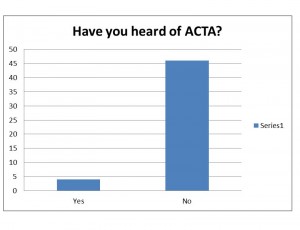Trade agreement may be ineffective
Author: Alexander Alusheff | Filed under: BGSU, Localizing story, Spring 2012, Student ContributorThe Anti-Counterfeiting Trade Agreement intends to place certain restrictions on the Internet, affecting one of its biggest demographics – college students.
ACTA, signed by President Obama back in 2011, allows industries affected by illegal downloading to charge Internet service providers for damages instead of the individuals committing the crime, said Cynthia Shipman, a doctoral student in media and communication.
To avoid lawsuits, service providers would be pressured into banning sites that provide means of illegally downloading from its users, Shipman said.
Any site considered a liability could be banned, she said.
The President’s signing of ACTA surpasses the failed attempt of Congress to pass the Stop Online Piracy Act, which outlined the expansion of law enforcement on the Internet to combat copyright infringement, Shipman said.
SOPA failed to pass in Congress due to widespread petition from the online community back in January.
But illegal downloading isn’t something that has recently become a problem for industries. According to the Recording Industry Association of America’s website, since file-sharing sites became popular in 1999, music sales dropped 53 percent.
The drop resulted in the recording and film industries taking legal action.
About 10 years ago, the recording started targeting college campuses.
Institutions across the country received subpoenas and court orders, said John Ellinger, chief information officer at Information Technology Services at BGSU, who was at The Ohio State University at the time.
Since then, Bowling Green State University has acquired Audible Magic, a program that tracks downloads from a specific site to an IP address and notifies a security team, Ellinger said.
From there, the team notifies the user and eliminates their internet usage for 24 hours. Repeat offenders get referred to the dean of students and get kicked off the internet for longer durations of time, he said.
“Since Audible Magic was put in, BGSU has not been contacted by any of those industries or delivered summons or subpoenas,” Ellinger said. “You have to be proactive as a student not to have that happen.”
Audible Magic also constantly updates itself, keeping tabs on any new downloading sights that may appear, Ellinger said.
So far this year, no student has been referred to the dean’s office from a cease and desist letter, said Michael Ginsburg, associate dean of students at BGSU.
Overall the office has received 100 notifications, down from 400 last year and from 600 the year before that, Ginsburg said.
Sophomore Mitchell Kirkwood said he used to file-share in high school, but never tried on campus.
“It was sketchy at first, but I knew a lot of people who did it that didn’t get caught,” Kirkwood said.
Kirkwood has since stopped sharing music online and currently buys his music from iTunes.
Regarding ACTA, he said if people want music, they’ll find a way to get it.
“There’s bigger things the country needs to worry about other than illegal downloading,” sophomore T.J. Supinger said.
While it may be effective, it will spark a lot of controversy; people will find loopholes around it somehow, Supinger said.
“If the service providers block service, with technology these days, it’s a far-fetched idea when people find ways around it all the time,” Ginsburg said.
ACTA provides a good educational opportunity for why students should comply, he said.
“People don’t understand the financial harm to their favorite artist versus that of the company,” Ginsburg said. “It takes money away from the artist who isn’t already a big star, so it has an economic impact on the individual.”
Tags: ACTA, Alusheff, BGSU, downloading, Ellinger, file-sharing, Ginsburg, music, RIAA, SOPA

